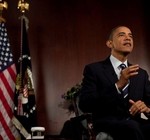An American President on an international trip moves like an aircraft carrier task force on the high seas. Supported by a fleet of ships, planes and special handlers, the President and the traveling press journey in wonder world of their own making.
That meant that days after a devastating election loss Barack Obama was seemingly able to recover with a sudden burst of success. His pledge to get India a seat on the United Nations Security Council received praise of “about time” from American internationalists. Obama even managed to pull out a second win with promises from Indian business leaders to create more jobs in the United States.
The flow of positive news from the President’s handlers to the traveling media rolled on for 5 days in a smooth flow of events and photo ops, relegating the election to a bad memory. But when the bad stuff hits, it also hits hard, and by Friday November 12, the miraculous recovery was over.
Two events sunk it. One was an international backlash by monetary officials in China and Germany against the Federal Reserve’s $600 billion money printing plan, called quantitative easing. The other was the President’s inability to get a market opening trade deal from South Korea.
“Obama’s Economic View Is Rejected on World Stage–China, Britain and Germany Challenge U.S.–Trade Talks With Seoul Fail, Too ” was the New York Times headline. “U.S. Hit By Trade Setback, Hang-Up with South Korea on Autos, Beef Dashes Obama Plan to Boost Exports”. Late night comics joked about the president going to India to see “our jobs there” and to China, where he did not go, to “see our money”.
NEGATIVE CASCADE
Part of the negative cascade was of the President’s own making. Set up months earlier, his Asia swing was supposed to be about foreign policy capped off with the G-20 economic meeting in Seoul. Building a stronger alliance with India, which did succeed, was part of the original script. But as the huge election loss hit home, with the President losing the core of his Middle America support, the trip message was suddenly shifted to jobs. Having the President trying to boost U.S. exports is part of creating U.S. jobs. Having the Fed vastly expanding the money supply in a slack economy is also supposed to be about engineering a growth spurt that gets employers hiring again. But hiring where? In the U.S, or in India, China, Indonesia where American multinationals make their goods? No one asked that question yet, but it will be asked.
The same with inflation and currency devaluation. With gold and commodity prices testing new highs, key monetary leaders saw the Fed engineering inflation and attempting to devalue the dollar under the guise of a growth policy to further lower interest rates.
Markets sensed the same conflict. By mid-week, stocks backed off their growth rally and the U.S. 30 year long bond reversed course to higher rates.
The President is now in a trap. Politically he misjudged the anger in the America against politicians and Wall Street and has paid a huge election price. Economically, he saw his massive $1.7 trillion bailout and spending plan to generate jobs fall woefully short.
With no leverage to push for more government spending programs he has to wait and see if a better economy emerges on its own and if so will his former supporters came back.
Rebranding his Asian trip as a mission to help the U.S. economy was probably the best hand he had to play. It just didn’t work. He’ll get little credit for shaking loose jobs, while taking blame for running a disguised dollar devaluation program that is sending hot money to developing nations like Brazil just as fast as it is to Europe.
STILL ENORMOUS POWER
Americans will now watch to see if the President is a fighter. He still has enormous power to block legislation he doesn’t want with a veto and with the White House stage, can blast others and set a national agenda anytime he wishes. But he can’t delegate control to Congress as he did over two years.
His Republican opponents won by running one of the most negative campaigns in modern history against his policies. They promised to generate jobs by cutting government and by diluting regulations on banks and business. If the jobs aren’t coming, and the banks hand out truck loads of new bonuses–almost a certainty–Obama can blame his opponents for doing even worse. That kind of negative leadership won’t fix the economy. Americans will be looking for an inspirational new voice, exactly what Obama was two years ago.
Bob Dowling is Editorial Advisor to Gateway House.
This article was exclusively written for Gateway House: Indian Council on Global Relations. You can read more exclusive content here.
For interview requests with the author, or for permission to republish, please contact outreach@gatewayhouse.in.
© Copyright 2010 Gateway House: Indian Council on Global Relations. All rights reserved. Any unauthorized copying or reproduction is strictly prohibited.


